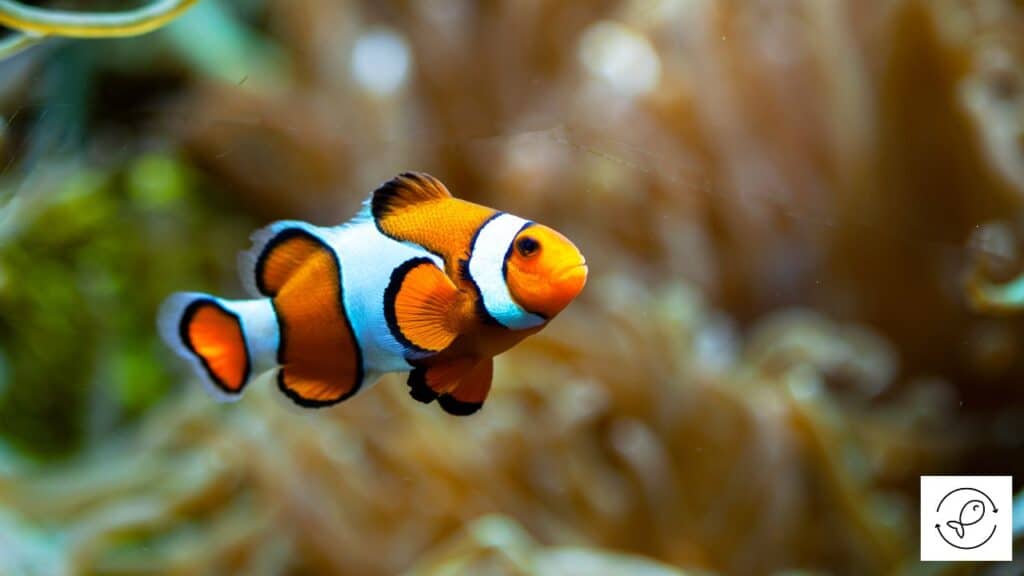Clownfish have become a household name since the release of the movies Finding Nemo and Finding Dory.
They’re one of the most popular marine aquarium fish species due to their unique appearance and behavior.
Let’s learn about these dazzling fish in more detail.
Clownfish Species Overview
Clownfish are one of the most popular marine fish belonging to the Pomacentridae family.
They’re commonly found in the tropical parts of the Pacific and the Indian Ocean.
These fish also inhabit the shallow lagoons near Southeast Asia and Australia.
Clownfish form a symbiotic relationship with sea anemones as they’re weak swimmers.
The anemones protect the clownfish against predators, while the latter clean the anemones by eating the parasites that live on their tentacles.
However, this mutually beneficial relationship doesn’t always translate to an aquarium setting.
Hence, anemones aren’t necessary for the survival of captive clownfish.
Another unique feature of clownfish is that they’re sequential hermaphrodites, meaning they’re born as males.
They can turn themselves into females when needed, mainly during mating.
Two males become mates, where the larger and dominant male turns into a female for reproduction.
But once they change their gender, they can’t turn it back.
Moreover, some clownfish species turn black after changing gender.
Appearance
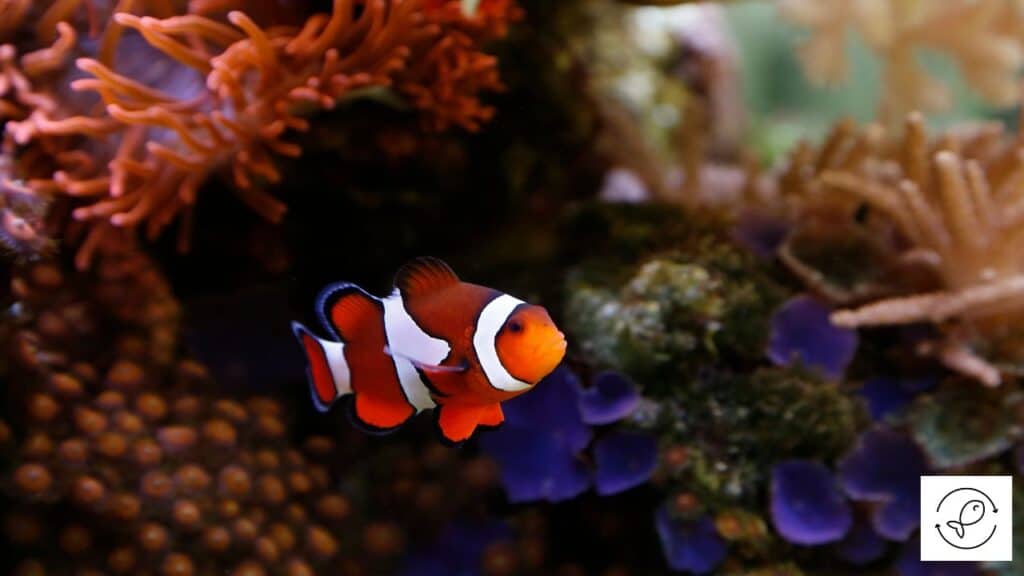
Clownfish are recognized by their orange body with three white stripes outlined in black.
However, there are over 30 species of these fish, each having a unique appearance.
You can find clownfish in diverse colors, such as red, white, or black.
Some clownfish species have large white spots on their body instead of bands, while others have a solid color with a single white band.
Clownfish have long and round bodies and a dip in their dorsal fins.
The true percula clownfish have 10 spines, while the false percula has 11 spines.
False percula clownfish and Percula clownfish have two tiny rounded dorsal fins that restrict their swimming speed.
Other clownfish species have a fan-shaped and fused dorsal fin that reaches down to the tail.
Since these fish have round bodies, they’re not efficient swimmers compared to other fish with streamlined bodies.
The overall appearance and characteristics of these fish vary as per the species.
Names of Species
Clownfish are found in various colors and sizes.
There are at least 30 species of clownfish, all varying in color, shape, size, and temperament.
The saltwater aquarium hobby has further diversified this striking fish by adding more embellished patterns and designs.
Some of the most common and popular clownfish species are:
- False Percula Clownfish,
- Percula Clownfish,
- Maroon Clownfish,
- Midnight Clownfish,
- Phantom Clownfish,
- Tomato Clownfish,
- Clarkii Clownfish,
- Longfin Mocha Clownfish,
- Pink Skunk Clownfish,
- Snow Storm Clownfish,
- Domino Clownfish,
- Three-band Clownfish,
- Red Sea Clownfish,
- Sebae Clownfish,
- Saddleback Clownfish,
- Oman Clownfish, etc.
Lifespan
The average lifespan of clownfish is around 5 to 10 years in captivity.
However, they can live longer than a decade, provided the living conditions are conducive.
Providing a clean and big tank with enough space and hiding places, stable water parameters, a nutritious diet, and favorable tankmates can help clownfish live a long and healthy life.
In the wild, clownfish can live up to 10 years. Predators and food shortages are their main challenges in the wild for survival.
Average Size
The average size of an adult clownfish is around 4.3 inches in length. However, the sizes of these fish vary as per the species.
For example, maroon clownfish can reach up to 6 inches compared to percula clownfish, the smallest clownfish species, which barely reaches three inches in length.
Female clownfish are usually larger than males.
It takes around 2 to 3 years for average to small-sized clownfish to reach their full size.
In contrast, larger-sized clownfish take about 3 to 5 years to reach their maximum size.
Clownfish Tank Setup
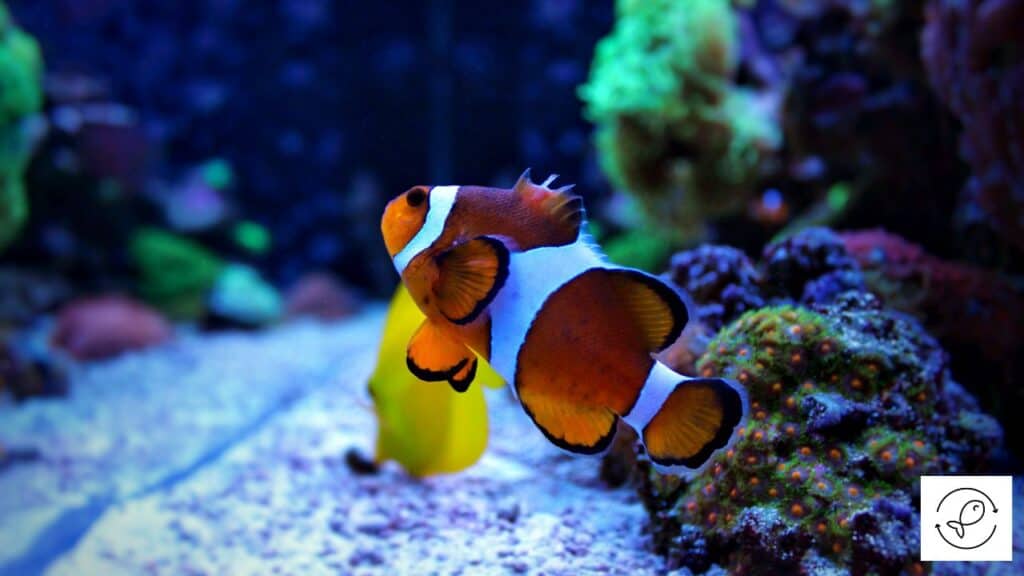
Clownfish don’t need a specialized tank setup to thrive. Stable water parameters, ample hiding places, and adequate food are sufficient for them.
Let’s understand how to set up a clownfish tank in more detail.
Tank Size
Clownfish need at least a 20-gallon tank to lead a happy life.
They need enough space in the tank to mark their territory, explore the tank, and hide when threatened.
An extra 10 gallons is recommended for every additional fish.
Also, a larger tank will be required if you wish to set up a community or a reef tank.
Clownfish usually establish their territories and prefer to swim around them. They don’t venture far from their territory.
Hence, a large tank is suitable to avoid territorial aggression.
Also, clownfish share a symbiotic relationship with anemones.
So if you have anemone species in your tank, the tank size should increase accordingly.
Smaller tanks can restrict their free movement leading to aggression.
They also need ample hiding places, which can be provided by having caves, rocks, plants, and aquarium decorations.
That’s why a larger tank is recommended because these things can be placed without restricting the free movement of clownfish.
Tank Equipment and Decorations
Clownfish prefer ample swimming space in the tank.
Hence, the tank layout should have open spaces and a lot of hiding places for clownfish to feel secure.
Aesthetic pleasure is also vital for clownfish as they’re used to living on reefs in the wild.
Hence, the tank must have colorful decorations like plants, rocks, corals, etc., for them to feel at home.
You can keep clownfish in a fish-only tank with live rocks or set up a reef tank with corals and other marine invertebrates.
Moderate lighting will be sufficient for a fish-only tank. However, intensity lights are necessary for a reef tank with corals.
The water current should be steady because clownfish don’t prefer high currents.
You can use an undergravel filter if the tank is small. But for a large tank, a canister or external filter is essential.
Given below are the items required in a clownfish tank:
- Large rocks and pebbles,
- Filter,
- Heater,
- Aquatic plants,
- Standard lighting for the fish-only tank,
- High-intensity lighting for reef tank with corals,
- Thermometer,
- PH testing kit, and
- Hiding places like live rocks, caves, driftwood, etc.
Clownfish Care
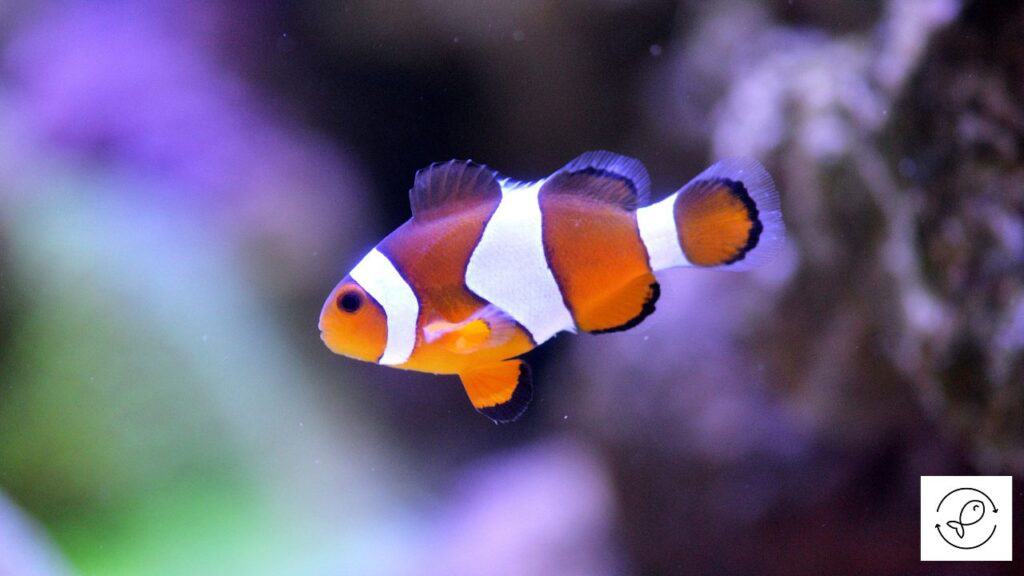
Clownfish are beginner-friendly fish as they’re easy to feed and adapt to a wide range of tank conditions.
You can increase their longevity and enjoy the company of these dazzling fish by taking proper care of them.
Diet
Clownfish are omnivores in nature.
In the wild, they feed on zooplankton like copepods, fish eggs and larvae, shrimp, algae, seagrasses, phytoplankton, black worms, white worms, krill, and other small crustaceans that fit in their tiny mouths.
It’s best to replicate their varied wild diet in captivity. A well-balanced diet of meat and greens is essential for optimal growth.
You can feed clownfish marine flakes and pellets containing spirulina or marine fish flakes as a staple diet.
Live or frozen food such as brine shrimp, mysis shrimp, krill, bloodworms, insect larvae, cooked mussels, clams, beef hearts, raw fish, etc., are excellent protein sources for clownfish.
These food items should be given as occasional treats, twice or thrice a week, because clownfish don’t need protein-rich food daily.
You can feed veggies such as cooked spinach, peas, chard leaves, lettuce, broccoli, and nori to clownfish as they contain essential vitamins and minerals.
Feeding veggies also adds a variety to their daily diet.
Avoid feeding food that is high in cholesterol and fat.
Also, avoid food containing additives, preservatives, and artificial colorants because they can cause health problems.
Water Parameters
Clownfish prefer clean and warm water as they belong to tropical waters in the wild.
The water conditions resembling their natural habitat are ideal for their optimum growth and health.
Clownfish adapt well to slight changes in water conditions.
However, it’s best to maintain stable water parameters as drastic and sudden variations can affect their behavior and health.
The ideal water parameters for clownfish are:
Water Temperature: 74°F to 80°F (23°C to 28°C),
Water pH: 8.0 to 8.4,
Specific Gravity (Salinity): 1.020 to 1.025,
Water Hardness (dKH): 8 to 12.
Tank Maintenance
Tank maintenance is key to keeping your clownfish healthy and happy.
Regular water changes are necessary to maintain optimum water quality.
To keep the aquarium clean, you should perform a 20% to 30% water change every 15 days.
Similarly, residues, substrate, and other decorations need to be cleaned regularly to avoid the buildup of harmful bacteria.
Regular maintenance of the filter and heater is also vital to ensure that they work at full capacity.
Water quality needs to be monitored consistently through regular testing.
Common Diseases
Clownfish are pretty hardy as they adapt well to various tank conditions.
However, it doesn’t mean that they’re immune to diseases.
Like other saltwater fish, clownfish can get infected if the water quality is poor or diseases are transmitted from live food.
The following are some common diseases that may affect clownfish:
- Bacterial infection,
- Fungal infection,
- Parasitic infection,
- Dropsy,
- White spots,
- Fin Rot,
- Swim Bladder Disease,
- Nutritional deficiency,
- Marine Ich,
- Hole-in-the-head disease, etc.
Clownfish Behavior and Temperament
Clownfish are usually peaceful with subdued personalities. While these fish are very active, they’re not fast swimmers.
Hence, they prefer to stay close to their claimed territory to feel secure.
While clownfish are docile, they can become aggressive during mating.
Both male and female clownfish get very aggressive during the mating ritual or while guarding their eggs against predators.
Clownfish can also display aggression when cramped for space, under stress, or when housed with their own kind.
Hence, providing them with adequate space and hideaways is vital to avoid stress.
Clownfish Tankmates
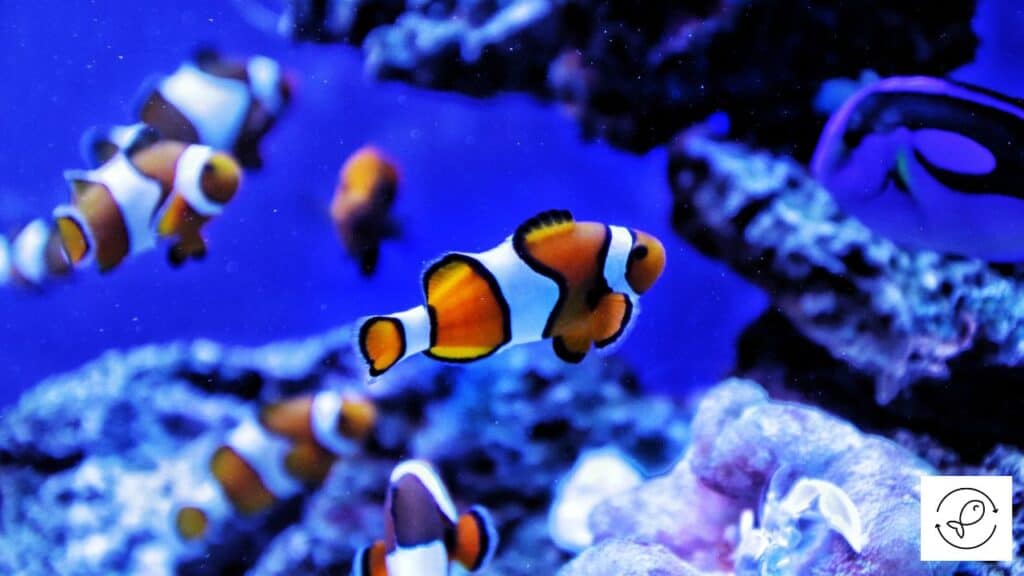
Clownfish are an excellent addition to community aquariums due to their docile nature and beautiful colors.
They’re best kept with other fish of similar size and temperament.
Certain factors like compatibility in terms of habitat, food habits, water parameters, and behavior will determine whether the two fish species can coexist peacefully or not.
Clownfish are also considered reef-safe. Hence they can be kept with other reef inhabitants, including corals, sea anemones, and invertebrates.
Some of the tankmates that you can keep with clownfish are:
- Damselfish,
- Butterflyfish,
- Dartfish,
- Wrasses,
- Gobies,
- Blennies,
- Shrimp like Harlequin, Peppermint, etc.,
- Corals like Mushroom corals, hammer corals, etc.,
- Green Chromis, etc.
Clownfish are slow-moving fish. So avoid housing any fast-moving fish with clownfish as it can stress them.
Also, avoid aggressive and predatory fish that can bully and stress the clownfish.
Some of the fish that you should avoid housing with clownfish are:
- Lionfish,
- Groupers,
- Triggerfish, and
- Different clownfish species.
Clownfish Breeding
Clownfish are easy to breed in captivity once they pair up.
You can house a group of 4 to 6 clownfish in a tank to encourage breeding.
Once the pair is formed, the breeding pair will mate.
The male clownfish will be seen charging toward the female and nipping her fins.
Since both clownfish become aggressive during the breeding, moving the pair to a separate breeding tank is recommended.
The water temperature of the breeding tank needs to be raised to 83°F.
Also, feeding a protein-rich diet is essential to condition the pair.
Rocks should be laid at the bottom of the breeding tank for the male clownfish to build a nest for spawning.
The female clownfish will spawn after around 5 days of mating.
A female clownfish lays around 100 to 1000 eggs in a single spawning event, depending on her age and species.
The average pair produces around 400 to 500 eggs, while the large clownfish species, like maroon clownfish, usually lay more than 1000 eggs.
It takes a couple of hours for the female clownfish to lay her eggs. The eggs will be tiny and orange in color.
The male clownfish will then swim over the eggs to fertilize them. Both the parents stay close to the nest to guard the eggs.
It takes around 6 to 8 days for the eggs to hatch. After hatching, you can notice the free-swimming larvae.
You must immediately turn off the filters once the eggs hatch to avoid the larvae getting filtered through the filters.
You can then transfer the male clownfish to the main tank while the female clownfish can continue to rear the young ones.
After about 10 to 12 days, the larvae will reach the fry stage.
At this stage, you can feed them powdered fish flakes and brine shrimp for healthy development.
You can nurture the fry in the breeding tank till they become young fish. Then, you can transfer them to the main tank.
Frequently Asked Questions
Do Clownfish Bite?
Clownfish bite their tankmates under stressful conditions. They mainly bite due to poor tank conditions, unfavorable water parameters, food scarcity, territoriality, or while guarding their eggs. Clownfish also bite humans while cleaning the tank as they feel threatened.
Why Do Clownfish Change Gender?
Clownfish change their gender from male to female mainly for reproduction. The male clownfish change their gender to female when the group’s alpha female passes away. This gender change doesn’t happen overnight. It takes several months. It’s also a one-time process since the change is irreversible.
How Do Clownfish Reproduce?
Clownfish reproduce by laying eggs. They breed all year long and spawn during the full moon in the wild. Depending on age and species, female clownfish lay around 100 to 1000 eggs that the males fertilize externally. Favorable tank conditions coupled with a nutritious diet are critical for their breeding.
Do Clownfish Eat Their Eggs?
Clownfish usually don’t eat their eggs unless they’re malnourished or stressed. Male clownfish eat weak, infertile, or damaged eggs to protect the fertile eggs. Inexperienced clownfish eat their eggs for the first few spawnings. You can protect the eggs by feeding your clownfish adequately and eliminating stress.
Why Don’t Clownfish Need Anemones in Aquariums?
Clownfish need anemones for survival in the wild. Anemones protect clownfish from predators as their sting is fatal for many marine creatures. Anemones are also a food source for clownfish. However, clownfish don’t need anemones in aquariums as there is no risk of predation or food scarcity.

